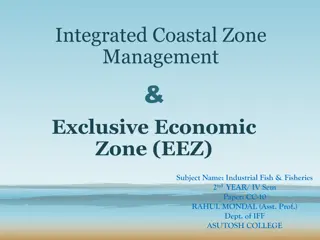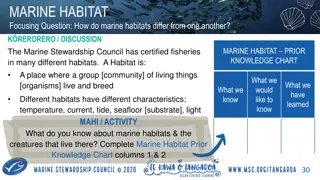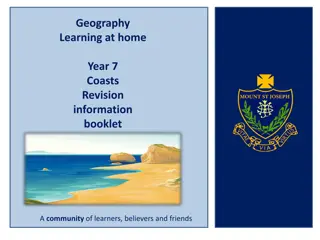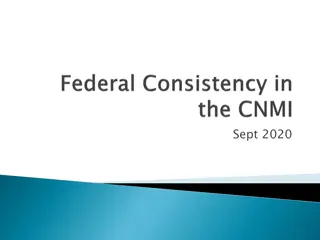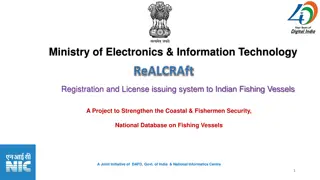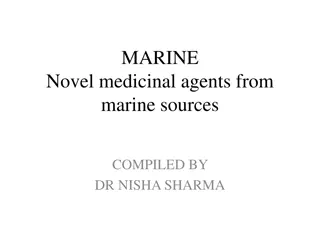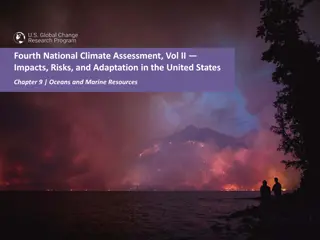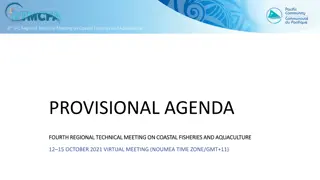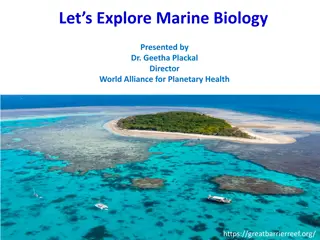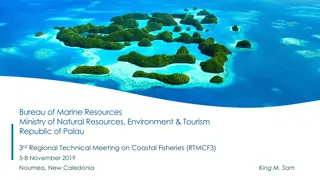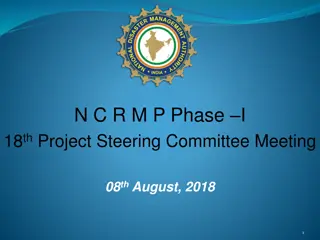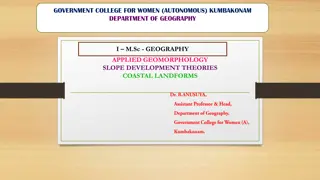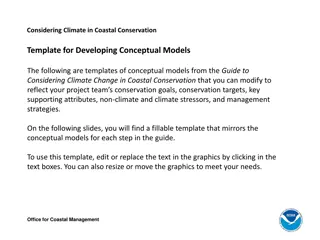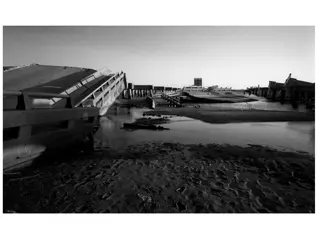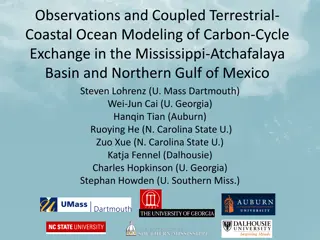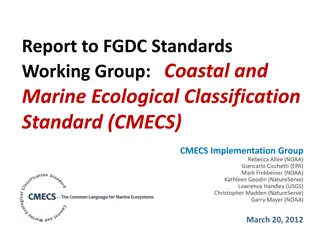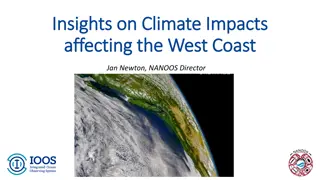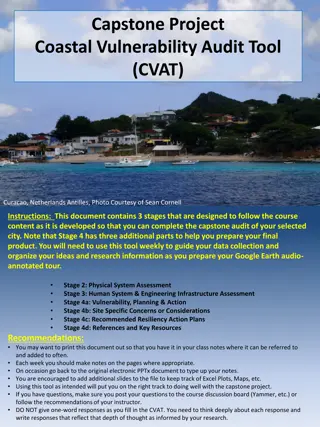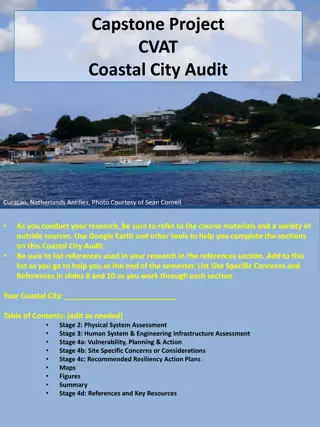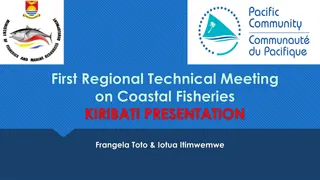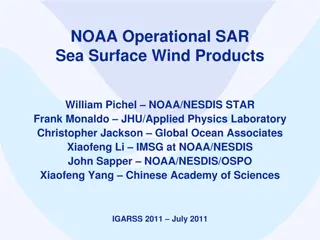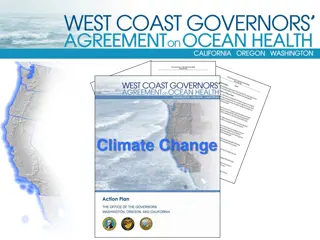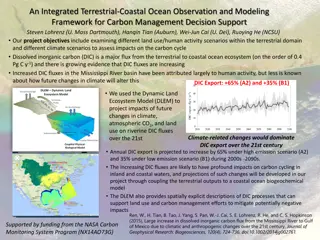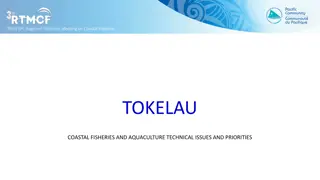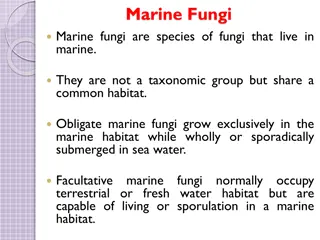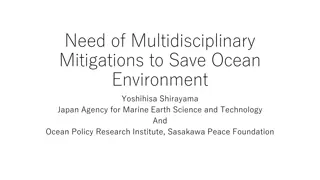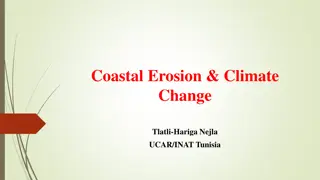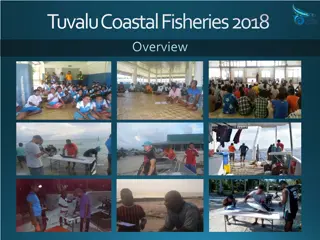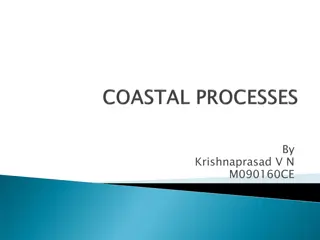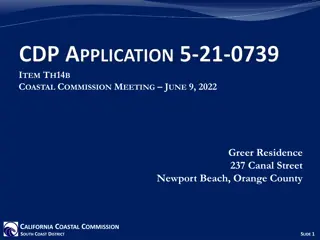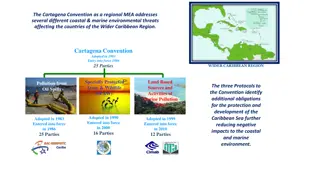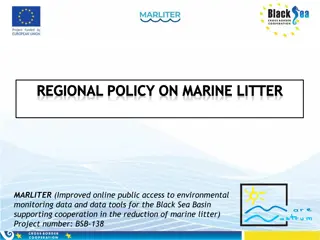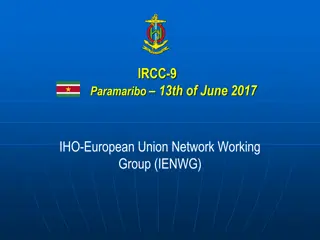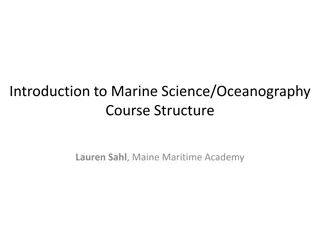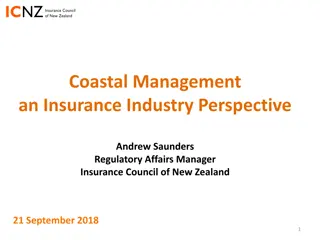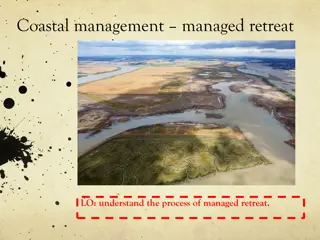Sphinx Marine - Offshore Marine Company in UAE
Sphinx Marine is an offshore marine company based in Ajman, UAE, established in 2006. They specialize in providing maritime navigation, communication, safety equipment, and services in the Gulf Area and Middle East. With a focus on customer-centricity, safety, and quality, Sphinx Marine is ISO 9001:
0 views • 20 slides
Coastal Monitoring and Lessons Learned in Southwest England
Southwest England's coastal monitoring efforts, including the South West Coastal Monitoring program and lessons learned from the destruction of Hallsands in 1917 due to lack of understanding of coastal processes. The monitoring involves data collection on beach profiles, bathymetry, wave patterns, a
4 views • 15 slides
Coastal Path Promotion Poster Design for Wales
Design promotional posters for the Coastal Path in Wales to encourage visitors to explore the 870-mile long coastal walking path accessible to walkers, cyclists, families, limited mobility individuals, and horse riders. Discuss the essence of marketing, its impact, target audience, and advantages an
4 views • 28 slides
Integrated Coastal Zone Management & Exclusive Economic Zone (EEZ) - Sustainable Coastal Management
The coastal zone is a vital area where land and sea interact, presenting dynamic challenges and opportunities. Integrated Coastal Zone Management (ICZM) is a science-based approach to managing coastal areas, aiming for sustainability by balancing environmental, economic, and human activities. ICZM,
0 views • 10 slides
Understanding Marine Habitats and Their Diverse Ecosystems
Marine habitats vary in characteristics such as temperature, current, tide, seafloor substrate, and light, influencing the communities of organisms that live within them. The certification of fisheries by the Marine Stewardship Council ensures minimal impact on local habitats, emphasizing the import
0 views • 6 slides
Understanding Coastal Processes and Erosion
Coasts are dynamic environments shaped by a variety of processes such as erosion and transportation. Waves influence the size and energy of waves, while erosion is caused by processes like corrasion and solution. Coastal transportation involves suspension, solution, and saltation. The impact of mari
6 views • 18 slides
Understanding Federal Consistency in Coastal Zone Management
This presentation serves as an introduction to Federal Consistency in the context of Coastal Zone Management, emphasizing the importance of compliance with enforceable policies outlined in the Coastal Zone Management Act. It highlights the role of the Division of Coastal Resources Management (DCRM)
1 views • 13 slides
Modernizing Indian Fishing Vessel Registration & Licensing System for Coastal Security
A government initiative, the Registration and Licensing of Fishing Craft (ReALCRAFT) project aims to enhance coastal security by registering Indian fishing vessels under a national database. The system issues Registration Certificates and Fishing License Certificates online, ensuring unique identifi
0 views • 31 slides
Marine Novel Medicinal Agents from Marine Sources Compiled by Dr. Nisha Sharma
Oceans, covering more than 70% of the Earth's surface, harbor a plethora of invertebrates and algal species, providing a rich source of medicinal compounds. Marine organisms have yielded commonly used drugs like shark and cod-liver oils, sodium alginate, agar-agar, and chitin. Various classification
1 views • 9 slides
Impacts of Climate Change on Oceans and Marine Resources in the United States
The Fourth National Climate Assessment highlights the disruption of ocean ecosystems due to increasing global temperatures, leading to loss of habitats, changes in species composition, and food web structure. Marine fisheries face high risks from climate-driven changes, impacting distribution, timin
1 views • 10 slides
4th SPC Regional Technical Meeting on Coastal Fisheries and Aquaculture - Provisional Agenda
The 4th SPC Regional Technical Meeting on Coastal Fisheries and Aquaculture is set to take place on 12-15 October 2021 in a virtual format. The agenda includes sessions on integrating e-data systems into coastal fisheries, enhancing capacity for fisheries management, and community-based fisheries di
0 views • 9 slides
Marine Biology: Importance, Scope, and Responsibilities
Exploring the realm of marine biology reveals its crucial role in understanding and preserving marine ecosystems under threat. This field offers diverse career opportunities, from research to conservation efforts. Marine biologists play a pivotal role in studying, monitoring, and protecting marine l
0 views • 14 slides
Coastal Fisheries and Aquaculture Development in Palau: Priorities and Progress
The Bureau of Marine Resources in Palau has identified key technical priorities for coastal fisheries and aquaculture development. These priorities include updating strategic plans, strengthening institutional frameworks, establishing data management programs, and enhancing aquaculture capabilities.
0 views • 6 slides
National Cyclone Risk Mitigation Project Phase I Summary
The National Cyclone Risk Mitigation Project (NCRMP) aims to reduce cyclone risk and vulnerability in coastal areas by developing an Early Warning Dissemination System, constructing cyclone risk mitigation infrastructure, and building capacity in coastal communities. Phase I in Andhra Pradesh and Od
0 views • 31 slides
Understanding Coastal Landforms: Formation and Characteristics
Coastal landforms are features shaped by erosion and sedimentation processes along coastlines. These landforms, including headlands, cliffs, bays, spits, salt marshes, and beaches, are predominantly influenced by factors such as wave action, longshore currents, tides, and climatic elements like wind
0 views • 35 slides
CTI-CFF Monitoring and Evaluation System: S.M.A.R.T. Indicators Overview
The CTI-CFF Monitoring and Evaluation System utilizes S.M.A.R.T. Indicators to track progress in achieving marine conservation goals. It includes workshops and meetings, roles, reporting, and accountability structures, as well as types of indicators focusing on funding, capacity building, and marine
0 views • 18 slides
Coastal Conservation Strategies for Climate Resilience
Develop conceptual models for coastal conservation goals, targets, and management strategies in the context of climate change. Templates provided for reducing coastal flooding using natural areas, addressing non-climate and climate stressors, and implementing effective management strategies to enhan
3 views • 6 slides
Louisiana Coastal Flooding Litigation Overview
The content discusses various aspects related to the Katrina Canal breaches consolidated litigation in Louisiana, focusing on the legal implications, failures in flood control measures, geology of coastal Louisiana, coastal elevations, and the impact of canal breaches on flooding in the region. It a
1 views • 30 slides
Coupled Terrestrial-Coastal Modeling of Carbon Exchange in the Gulf of Mexico
Explore the interactions between terrestrial and coastal systems in the Mississippi-Atchafalaya Basin and Northern Gulf of Mexico through coupled terrestrial-coastal ocean modeling. The study focuses on carbon dynamics, uncertainties in coastal carbon budgets, and the NASA IDS project's approach. Fu
3 views • 26 slides
Coastal and Marine Ecological Classification Standard (CMECS) Implementation Progress
The report highlights the development, timeline, objectives, and importance of the Coastal and Marine Ecological Classification Standard (CMECS) along with its implementation progress. It discusses the need for a national standard for classifying coastal and marine habitats, the objectives of CMECS,
1 views • 38 slides
Climate Impacts on the U.S. West Coast: Insights and Challenges
Climate impacts on the U.S. West Coast, including marine heat waves, species range shifts, hypoxia, ocean acidification, harmful algal blooms, sea level rise, and coastal erosion. Insights from experts like Jan Newton, NANOOS Director, highlight the significance of monitoring and addressing these en
0 views • 9 slides
Coastal Vulnerability Audit Tool (CVAT) for Curacao, Netherlands Antilles
This document outlines the stages of the Coastal Vulnerability Audit Tool (CVAT) for assessing the physical system and human system & engineering infrastructure of Curacao, Netherlands Antilles. It covers key aspects such as coastal setting, climatic and tectonic settings, topographic profile, coast
0 views • 10 slides
Coastal Vulnerability Assessment of Curacao, Netherlands Antilles
Conduct a comprehensive Coastal Vulnerability Audit of Curacao, Netherlands Antilles, using the Coastal Vulnerability Audit Tool (CVAT) to assess physical, human, and engineering infrastructure systems, as well as vulnerability, planning, and resiliency action plans. Consider factors such as climati
0 views • 10 slides
Enhancing Coastal Fisheries Data Collection in Kiribati: Challenges and Innovations
Presentation at the First Regional Technical Meeting on Coastal Fisheries in Kiribati covered current data collection methods, challenges faced including communication delays and lack of fisheries officers, and proposed innovations such as a smartphone app for e-reporting and using VHF radio for ema
0 views • 9 slides
NOAA SAR High-Resolution Coastal Winds Overview
NOAA's Operational SAR Sea Surface Wind Products provide detailed information on wind patterns derived from SAR images. The system aims to implement high-resolution wind production, capable of deriving winds from various SAR satellites. The operational goals include compatibility with international
0 views • 28 slides
Coastal Climate Change Impacts and Adaptation Strategies Overview
This overview delves into the impacts of climate change on coastal areas, including shoreline changes, coastal hazards, and coastal geomorphic systems. It highlights the physical forcing mechanisms, such as sea level rise and increased storm activity, affecting these regions. The assessment emphasiz
0 views • 14 slides
Integrated Terrestrial-Coastal Ocean Framework for Carbon Management
An advanced framework integrating terrestrial and coastal ocean observations and modeling is developed to support carbon management decisions. The study focuses on assessing the impacts of land use, human activities, and climate scenarios on the carbon cycle, particularly dissolved inorganic carbon
0 views • 5 slides
Coastal Fisheries and Aquaculture Priorities in Tokelau
This document discusses the technical issues and priorities for coastal fisheries and aquaculture in Tokelau, a group of low-lying coral atolls heavily dependent on coastal resources. It highlights the need for assessing fisheries resources, supporting sustainability, and exploring aquaculture poten
0 views • 6 slides
Overview of Marine Fungi and Their Habitats
Marine fungi are diverse species that inhabit marine environments, with some being obligate marine fungi while others can adapt to various habitats. They play essential roles in marine ecosystems by decomposing organic matter and interacting with other organisms. Factors affecting their distribution
2 views • 13 slides
Multidisciplinary Mitigations for Ocean Environment Conservation
Global ocean climate change poses significant threats to marine ecosystems, requiring multidisciplinary approaches for mitigation. Japanese research highlights expanding distributions of reef-building corals, deep-sea water temperature rise, ocean acidification impact on marine plankton, and thinnin
0 views • 4 slides
Understanding Coastal Erosion and Climate Change Impact in Tunisia
Coastal erosion and climate change pose significant threats to Tunisia's coastal areas, affecting ecosystems, economy, and human livelihoods. Climate change exacerbates erosion through rising sea levels, extreme weather events, and human activities. Understanding these phenomena is crucial for susta
0 views • 18 slides
Tuvalu Coastal Fisheries 2018 Overview and Current Activities
Tuvalu Coastal Fisheries Department aims to maximize social and economic returns by sustainably managing marine resources. Their priorities include supporting livelihoods through inshore fisheries and generating revenue from oceanic fisheries. The Coastal Division focuses on outer island and Funafut
0 views • 8 slides
Understanding Coastal Processes: Erosion, Deposition, and Human Impact
Coastal processes involve a complex interplay of erosion, deposition, and human activities that impact the dynamic equilibrium of coastlines. Energy from tides, waves, wind, and currents shape the land-water interface, while human use of coasts introduces conflicts leading to unstable systems. Sedim
0 views • 44 slides
Coastal Commission Meeting June 9, 2022 - Project Plans and Approval Conditions
The Coastal Commission Meeting on June 9, 2022, at the Greer Residence in Newport Beach, California, discussed the proposed development involving the removal of unpermitted structures and encroachment into the Seminuk Slough wetland. Project plans, including the demolition of a deck, were presented
0 views • 5 slides
Addressing Coastal and Marine Environmental Threats in the Wider Caribbean Region
The Cartagena Convention, along with its Protocols, aims to protect the coastal and marine environment in the Wider Caribbean Region by addressing issues such as marine pollution, oil spills, and wastewater management. The Convention emphasizes sustainable financing, institutional reforms, and enhan
0 views • 23 slides
European Union Regulations and Directives on Marine Litter and Waste Management
Marine litter poses a significant threat to the marine environment, prompting the adoption of various international, regional, and national instruments to address the issue. Key directives such as the Marine Strategy Framework Directive and Waste Framework Directive set out measures to achieve good
1 views • 16 slides
European Hydrographic Activities and Marine Data Initiatives
IRCC-9 in Paramaribo discussed the IHO-EU Network Working Group's efforts to monitor and manage hydrographic aspects. The Coastal Mapping project aims to enhance digital mapping in the EU while EMODNet provides access to marine data. Improving cooperation with EU Directorates-General and monitoring
0 views • 8 slides
Exploring Marine Science and Oceanography Course Structure
This marine science and oceanography course dives into the traditional structure of understanding oceans, from Earth-building processes to human interactions. It also introduces a unique approach focusing on the oil/plastics cycle, engaging students in active learning and discussions on geoethics. T
0 views • 11 slides
Coastal Management and Insurance Industry in New Zealand
Coastal areas in New Zealand face risks from flooding, storm surges, and sea-level rise, making insurance crucial for managing property losses. Insurers respond to coastal risks by adjusting premiums, excesses, and coverage. Long-term coastal planning involves managing risks through strategic buildi
0 views • 6 slides
Understanding Managed Retreat in Coastal Management: Wallasea Island Case Study
Wallasea Island in Essex, England employed managed retreat as a coastal management strategy, removing the sea wall to allow natural coastal processes. This decision, despite impacting local agriculture, led to the creation of salt marshes, serving as a cost-effective and environmentally beneficial s
0 views • 7 slides



